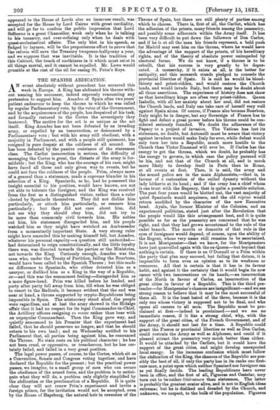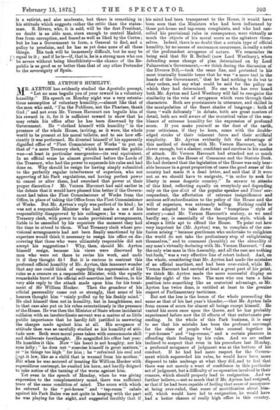THE SPANISH ABDICATION.
AN event absolutely without precedent has occurred this week in Europe. A King has abdicated his throne with- out naming his successor, indeed expressly renouncing any pretension to suggest him. Amadeo of Spain after two years' patient endeavour to keep the throne to which he was called by regular Parliamentary vote, by the voice of the Government, and by the acquiescence of the people, has despaired of his task, and formally restored to the Cortes the sovereignty they bestowed. The motive for the act is as unique as the act itself. King Amadeo has not been defeated by an invading army, or expelled by an insurrection, or denounced by a Parliamentary vote ; but with his army still obedient, with a majority in Parliament, and with a people still quiescent, has resigned in pure despair at the coldness of all around. He has been defeated by the passive resistance of the statesmen class. The Carlist insurrection is serious, the difficulty of managing the Cortes is great, the distaste of the army is for- midable ; but the King, who has the courage of his race, might have faced all these and only given way to events, but he could not face the coldness of the people. Prim, always more of a general than a statesman, made a supreme blunder in his selection of a King. Spaniards, as he, had he possessed the insight essential to his position, would have known, are not yet able to tolerate the foreigner, and the King was received from the first as a distinguished visitor, rather than a ruler elected by Spaniards themselves. They did not dislike him particularly, or attack him particularly, or censure him particularly ; but they did not care about him, did not see why they should obey him, did not try to be more than commonly civil towards him. His nobles cut him, his statesmen disregarded him, and his people watched him as they might have watched an Ambassador from a momentarily important State. A very strong ruler might have amended this by making himself felt, but Amadeo, whatever his personal capacity—a question still undecided— had determined to reign constitutionally, and the little loyalty there was, was directed towards the parties or the Ministries, not towards the King. Curiously enough, Amadeo was the man who, under the Treaty of Partition, failing the Bourbons, would have been called to the Spanish Throne ; but this made no difference to Spaniards, who either detested him as a usurper, or disliked him as a King in the way of a Republic, or—and this was the commonest feeling—disregarded him as a mere figure-head. Prim was killed before he landed, and party after party fell away from him, till when he was obliged to resort to the Radicals, it became evident that the end was near at hand, a throne supported by crypto-Republicans being impossible in Spain. The aristocracy stood aloof, the people were regardless, and at last the army showed in the Hidalgo affair that it had no respect for its legal Commander-in-Chief, the Artillery officers resigning en masse rather than bear with an unpopular Commandant. Then the King gave way, and quietly announced to his Premier that the experiment had failed, that he should persevere no longer, and that he should return to his own land ; and on Wednesday notified to his Parliament that, all parties being against him, he renounced the Throne. No stain rests on his political character ; he has not been cruel, or oppressive, or treacherous, but he has cer- tainly failed, and failed in a very great position.
The legal power passes, of course, to the Cortes, which sit as a Convention, Senate and Congress voting together, and have declared the Republic for the present ; but the practical power passes, we imagine, to a small group of men who can secure the obedience of the armed force, and the problem is to antici- pate what they will do, a problem only slightly simplified by the abdication or the proclamation of a Republic. It is quite clear they will not renew Prim's experiment and invite a foreign prince, for the invitation would not be accepted, even by the House of Hapsburg, the natural heir in reversion of the
Throne of Spain, but there are still plenty of parties among which to choose. There is, first of all, the Carlist, which has the adhesion of the priests, many friends among the peasantry, and possibly some adherents within the Army itself. It has been very difficult to put down the followers of Don Carlos, and if he is at all the man his friends represent, a bold push for Madrid may seat him on the throne, where he would have the advantage of the support of the priests, of his hereditary rights, and of the theory of absolute power unimpeded by electoral forms. We do not know, if a throne is to be rebuilt, that his success is very greatly to be depre- cated. A monarchy, if it exists at all, is the better for antiquity, and this monarch stands pledged to concede the provincial liberties of Spain. It is said he would be blood- thirsty and priest-ridden, and would restore the Church lands, and would invade Italy, but there may be doubt about all those assertions. The experience of history does not show us that hereditary kings are often very priest-ridden. Queen Isabella, with all her anxiety about her soul, did not restore the Church lands, and Italy can take care of herself very well against Spain alone. Of course, if France also became Bourbon, Italy might be in danger, but any Sovereign of France has to fight and defeat a great power before his throne could be con- sidered seriously founded. We doubt the adherence of the Papacy to a project of invasion. The Vatican has lost its statesmen, no doubt, but Antonelli must be aware that victory I against invaders would make Italy for ever, while defeat would only turn her into a Republic, much more hostile to the Church than Victor Emanuel will ever be. If Carlos has the energy to get the throne, which we doubt, he probably has the energy to govern, in which case the policy pursued will be his, and not that of the Church at all, and is much more likely to develop itself in Paris than in Rome, at all events at first. Then, it is said, the army and the armed police are in the main Alphonsists,—that is, in favour of a restoration of the exiled dynasty without the lady hitherto at its head ; and if the army has a chief whom it can trust with the Regency, that is quite a possible solution. The past four years would be blotted out, the vast majority of quiet Spaniards would acquiesce, and the old re:gime would return modified by the character of the new Executive head. Ayala, the former Minister of the Colonies, and an I experienced politician, stated just after the Revolution that the people would like this arrangement best, and it is quite possible as far as the peasantry are concerned that he was right, and that they had grown accustomed to the rule of the cadet branch. The merits or demerits of that rule in the eyes of foreigners would depend, of course, upon the ability of the Regent, whose very name still remains to be ascertained, It is not Montpensier—that we know, for the Montpensiers have just quarrelled again with the ex-Queen—but beyond that nothing is certain. If there is an O'Donnell or a Prim within the party that plan may succeed, but failing that datum, it is impossible to form even an opinion as to its weakness or resources. All that is certain is that it has in its favour habit, and against it the certainty that it would begin its new career with two insurrections on its hands,—an insurrection of the North in favour of Carlos, an insurrection of the great cities in favour of a Republic. This is the third pre- tender—for Montpensier's chances are insignificant—and we see strong reason to believe that it may be the most successful of them all. It is the least hated of the three, because it is the only one whose victory is supposed not to be final, and who opens all careers to all men. The Republic must be pro- claimed at first—indeed is proclaimed—and we see no immediate reason, if it has a strong chief, why, with the support of the great cities, of the French Government, and of the Army, it should not last for a time. A Republic could grant the Fueros or provincial liberties as well as Don Carlos, could restrain the Army as well as Alphonso, and could if it pleased attract the peasantry very much better than either. It would be attacked by the Carlists, but it .7ould have the support of the great cities, and might develop unexpected local energy. In the immense confusion which must follow the abdication of the King, the chances of the Republic are pos- sibly the best of all, if only the party has in its ranks one first- rate man, a point upon which neither Spaniard nor foreigner can as yet finally decide. The leading Republicans have never been in office, and the first of all, Figueras and Castelar, may turn out to be rather litte'rateurs than statesmen. The latter is probably the greatest orator alive, and is not to English ideas extreme; but he is disliked and dreaded by the Church, and unknown, we suspect, to the bulk of the population. Figueraa is a satirist, and also moderate, but there is something in his attitude which suggests rather the critic than the states- man. S. River°, who, it is said, will be the first President, no doubt is an able man, stern enough to control Madrid, free from corruption, and feared as well as liked by the Cortes ; but he has a Government to form, a General to find, and a policy to proclaim, and he has as yet done 110120 of all these things. His task will be immensely difficult, but he may be n equal to it ; and if he is—if, that is, he is a strong man who can be severe without being bloodthirsty—the chance of the Re- ' public is as good as or better than that of any other Pretender to the sovereignty of Spain.



































 Previous page
Previous page